MercoPress. South Atlantic News Agency
Antarctica
-
Friday, January 17th 2020 - 17:02 UTC
Falklands/South Georgia governments relation mutually beneficial, but MOU “has not been made public”

The relationship between the Falkland Islands Government and South Georgia Government “brings both direct and indirect benefit to the Falklands” assured Government of South Georgia & the South Sandwich Islands (GSGSSI ) Chief Executive Helen Havercroft.
-
Thursday, January 16th 2020 - 19:15 UTC
Brazilian Antarctica base reopened from its ashes after eight years
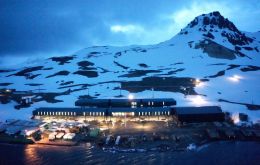
Brazil Wednesday reopened its scientific Comandante Ferraz base in Antarctica, which had been destroyed in a fire in 2012. In the incident two soldiers died and more than two thirds of the facilities were destroyed.
-
Monday, January 6th 2020 - 09:50 UTC
Argentina, a bi-continental territory, South Atlantic and Antarctica; this year marks the 200th anniversary of its flag in the Falklands

The administration of Argentine president Alberto Fernandez will implement an integral policy towards the Malvinas Islands, Antarctica and the South Atlantic because it wants to emphasize the maritime projection of Argentina and the fact that it is a bi-continental territory.
-
Saturday, January 4th 2020 - 09:55 UTC
Argentine president recalls when the British invaded the Malvinas and reaffirms Antarctica policy
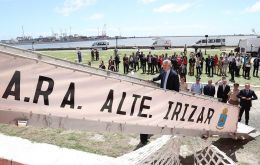
President Alberto Fernandez on Friday underlined the significance of Argentina's standing presence in Antarctica, --to defend its sovereignty claims--, and also recalled that 187 years ago the British invaded and usurped the Malvinas Islands, a land which “we will never renounce to, and we will always claim”.
-
Monday, December 30th 2019 - 09:58 UTC
Filmus officially appointed as Malvinas, Antarctica and South Atlantic Secretary

The Argentine government made official the appointment of Daniel Filmus as head of the Malvinas, Antarctica and South Atlantic Secretary, which depends on the ministry of foreign affairs and worship.
-
Monday, December 30th 2019 - 09:45 UTC
Freezing record: Six men cross the Drake Passage to Antarctica rowing, in 13 days

As freezing water thrashed their rowboat in some of the most treacherous waters in the world, six men fought for 13 days to make history, becoming the first people to traverse the infamous Drake Passage with nothing other than sheer manpower.
-
Wednesday, December 18th 2019 - 09:55 UTC
Falklands provides sea and air support for the search of missing Chilean aircraft
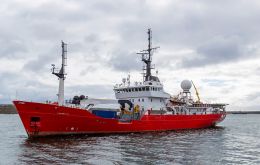
Falkland Islands based PHAROS SG, on regular deployment as a South Georgia and South Sandwich Islands fishery patrol vessel, returned on Tuesday morning to Stanley Harbour, after assisting in the search for wreckage and debris from the Chilean C130 aircraft that went missing on Monday 09 December.
-
Monday, December 16th 2019 - 09:40 UTC
Icebreaker “Almirante Irizar” completing a supply round of Argentine Antarctic bases and stations
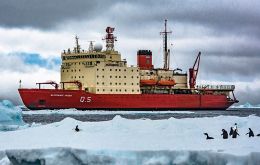
Argentina's icebreaker ARA Almirante Irizar has completed its round of supplying Antarctic bases, on time and according to planning, reports the Antarctic Joint Command. The bases involved are Esperanza, Marambio and Carlini.
-
Monday, December 16th 2019 - 09:22 UTC
Antarctica seabed survey identifies the deepest point on earth
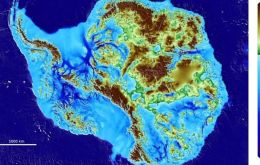
A group of glaciologists discovered the deepest point on land under an Antarctic glacier. Among other findings of BedMachine Antarctica, a mapping project for the white continent, glaciologists said one of the most striking ones was finding “the world’s deepest land canyon below Denman Glacier in East Antarctica.”
-
Friday, December 13th 2019 - 18:03 UTC
Finding survivors from doomed Chilean Hercules unlikely but trips will continue
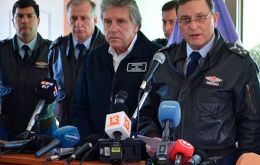
Chilean Air Force (FACh) Chief-of-Staff General Arturo Merino Núñez Thursday ruled out the possibility of finding any survivors from Monday's Hercules C-130 transport aircraft which crashed into the Drake Passage enroute to Antarctica with 38 people onboard after human parts from the wreckage were found later in the week.
